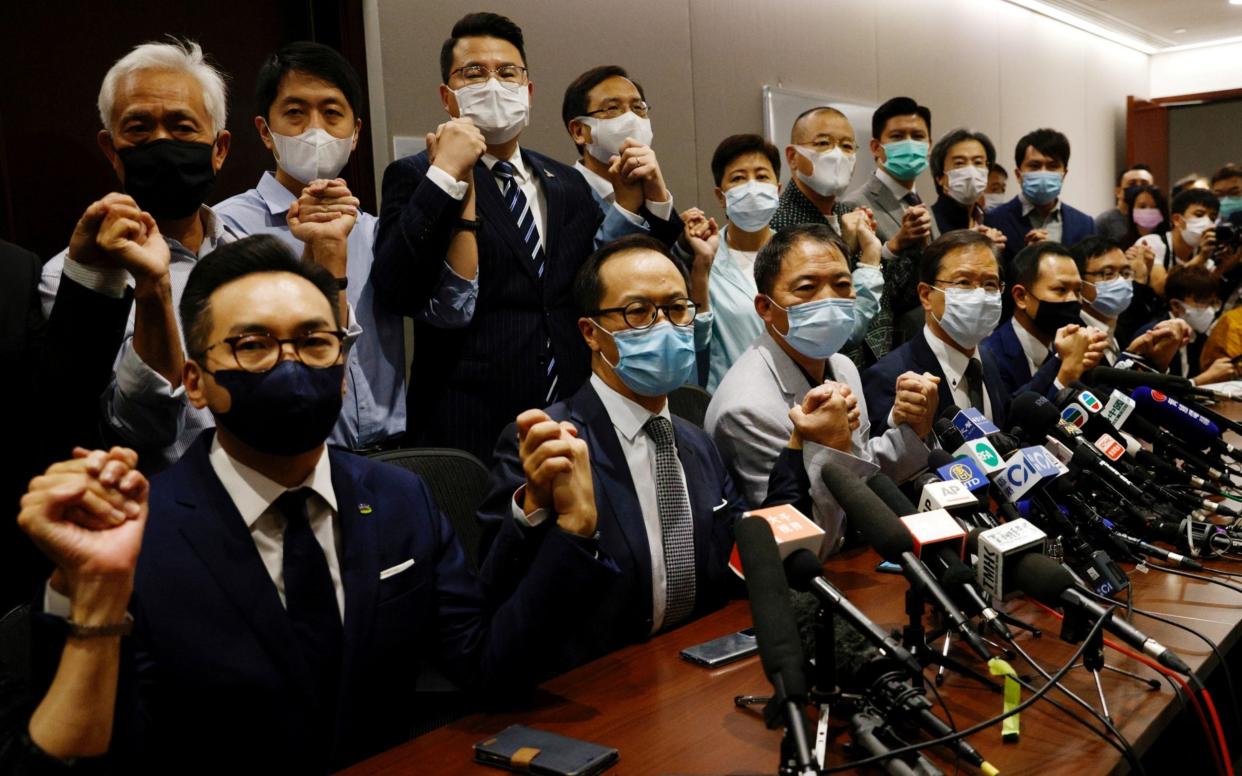Mass resignations as Hong Kong ousts four pro-democracy lawmakers

Hong Kong’s parliament has been plunged into turmoil as 15 pro-democracy lawmakers announced they would resign in protest against a decision by Beijing to unseat four of their colleagues.
The news comes just hours after China’s ruling Communist Party granted Hong Kong officials sweeping powers to remove lawmakers deemed a threat to national security.
Authorities in Hong Kong moved swiftly, saying four lawmakers – Dennis Kwok, Alvin Yeung, Kwok Ka-ki and Kenneth Leung – would “lose their qualification as legislators immediately.”
Hong Kong’s pro-Beijing leader Carrie Lam called the decision “legal, reasonable and necessary.”
Members of the pro-democracy, anti-Beijing camp were just as quick to respond.
“We will resign from our positions because our partners, our colleagues are being disqualified by the central government’s ruthless move,” said Wu Chi-wai, a pro-democracy lawmaker and chairman of the Democratic Party.
“According to the Basic Law, there is separation of power, but today, the decision made by the central government simply said that all the separation of power will be taken away, and all the power will be centralised in the chief executive.”
Once the resignations are accepted and take effect, Hong Kong’s mini-parliament, the 70-member Legislative Council, will be reduced by about a third, with remaining lawmakers largely supportive of Beijing's increasingly aggressive policies.
“In terms of legality and constitutionality, obviously from our point of view this is clearly in breach of basic law and our rights to participate in public affairs, and a failure to observe due process,” said Dennis Kwok, one of the ousted lawmakers.
Mr Yeung, also unseated, pledged to continue supporting freedoms in Hong Kong out of office, even though “the road ahead will be bumpy, difficult and challenging.”
The Chinese government has long sought to wrest back complete control of Hong Kong, where treasured liberties were meant to be guaranteed for 50 years after the former British colony was returned to Beijing in 1997.
But government efforts to exert greater influence and instill loyalty to the ruling party among Hong Kong people backfired, with a pro-democracy movement gaining traction and finally erupting in mass protests that engulfed Hong Kong last year.
More than 10,000 people have been arrested in Hong Kong during the pro-democracy protests from June 2019 through September this year.
Political tumult has also played out in the city’s legislative chamber, with lawmakers breaking out in scuffles, filibustering votes, staging demonstrations and even throwing foul-smelling liquids.
Ousting the lawmakers is Beijing’s latest move to snuff out challenges to the authority of the Communist Party and has been widely condemned by international figures.
“This campaign to harass, stifle and disqualify democratic opposition tarnishes China's international reputation and undermines Hong Kong’s long-term stability," said UK Foreign Secretary Dominic Raab.
"This is yet another example of the Chinese Communist Party trampling on what is left of democracy in Hong Kong," added Lord Chris Patten, the former Governor of Hong Kong.
"Once again, Xi Jinping's regime has demonstrated its total hostility to democratic accountability, and those who wish to stand up for it."
Yamini Mishra, Amnesty International’s Asia-Pacific regional director, described the move as “a politically motivated attempt to legitimise repression of opposition legislators."
The disqualifications came after an elite Chinese political body – the National People’s Congress Standing Committee – on Wednesday passed a resolution stating that lawmakers deemed to endanger national security would lose their seats.
The resolution specifically labelled four acts considered threats to national security: supporting Hong Kong independence, refusal to acknowledge China’s sovereignty over the city, seeking intervention by foreign powers in domestic affairs, or behaviour that jeopardises national security.
In June, Beijing imposed a national security law that criminalises behaviour deemed by authorities as subversion, secession, terrorism or foreign collusion, punishable by up to life in prison.
Police have used the law to arrest people over social media posts and in apparent efforts to prevent activists from seeking asylum overseas.
The four ousted lawmakers were earlier banned from running in the city’s legislative elections, originally scheduled for early September, after calling on the US to sanction Hong Kong officials.
Elections have seen been postponed for a year, with Hong Kong authorities citing public health concerns given the coronavirus pandemic.
The Chinese foreign ministry on Wednesday reiterated its support for the Hong Kong government to “carry out its duties in accordance with the decision” that had been handed down from Beijing.

